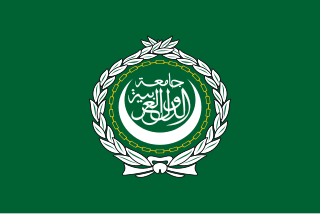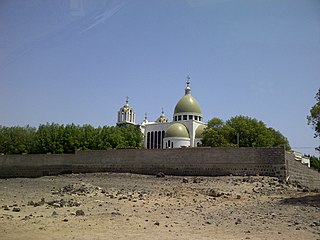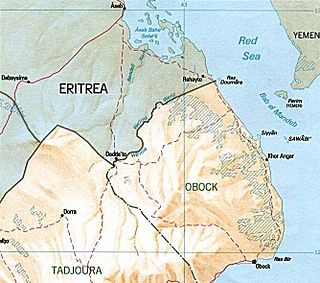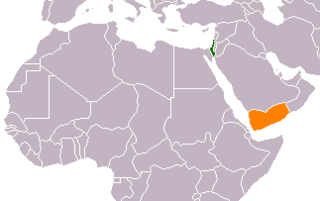Arab League | Eritrea |
|---|---|
Eritrea is one of the three non-member states of the Arab League which adopted Arabic as a working language. Eritrea chooses not to be a part of the Arab League.
Arab League | Eritrea |
|---|---|
Eritrea is one of the three non-member states of the Arab League which adopted Arabic as a working language. Eritrea chooses not to be a part of the Arab League.
In 1993, after independence, Eritrea adopted a policy of getting in touch with the Arab states, a move that several intellects in the country were divided upon, some preferring to join the Arab League as an Observer, others calling for joining as a Member, while others called for not getting in touch with the country's mostly Arab perimeter, with Sudan on its northwestern borders, Djibouti on the southeastern borders, and the Arabian Peninsula across the Bab el Mandeb. [1]
In 2003, Eritrea finally agreed on joining as an Observer, a country adopting Arabic language as a second Language, after a Presidential announcement that Eritrea will not be joining any regional organisation, he explained that the Arab League lacks efficiency. [2]
In 2010, the Eritrean president Isaias Afewerki, sent a letter to the Arab League Secretary-General Amr Moussa, calling for the Arab League's pressure on removing the latest UN sanctions over the country. The sanctions were enforced after his country was accused of supporting insurgents in Somalia, and were enacted in the UNSC by 13 of the 15 members.
Eritrea has been in two conflicts with Arab League members: Yemen in a dispute over the Hanish Islands in 1996 resulted in a brief conflict, and clashes with Djibouti in 2008, over the Ras Doumeira region, where the Arab League held an emergency session in response to the fighting and called for Eritrea to withdraw from the border region.

Eritrea is an ancient name, associated in the past with its Greek form Erythraia, Ἐρυθραία, and its derived Latin form Erythræa. This name relates to that of the Red Sea, then called the Erythræan Sea, from the Greek for "red", ἐρυθρός, erythros. But earlier Eritrea was called Mdre Bahri. The Italians created the colony of Eritrea in the 19th century around Asmara and named it with its current name. After World War II, Eritrea annexed to Ethiopia. Following the communist Ethiopian government's defeat in 1991 by the coalition created by various armed groups notably the EPLF and the TPLF among others, Eritrea declared its independence. Eritrea officially celebrated its 1st anniversary of independence on May 24,1993.

The Politics of Eritrea and the Government of Eritrea takes place in a framework of a single-party presidential republican totalitarian dictatorship. The President officially serves as both head of state and head of government. The People's Front for Democracy and Justice is the only political party legally permitted to exist in Eritrea. The popularly elected National Assembly of 150 seats, formed in 1993 shortly after independence from Ethiopia, elected the current president, Isaias Afwerki. There have been no general elections since its official independence in 1993. A new constitution was drafted in 1993 and ratified in 1997, but has not been implemented. Since the National Assembly last met in January 2002, President Isaias Afwerki has exercised the powers of both the executive and legislative branches of government.

The foreign relations of Eritrea are the policies of the Eritrean government by which it administers its external relations with other nations. Since its independence, Eritrea's foreign relations have been dominated by conflict and confrontation, both in the regional and international arenas. It has maintained often troubled, and usually violent, relations with its neighbors, including brief armed conflicts with Yemen and Djibouti and a destructive war with its bigger-neighbour, Ethiopia. At present, Eritrea has very tense relations with neighboring Ethiopia and Djibouti. Relations in the international arena also have been strained since the last decade, particularly with major powers. What appeared cordial relations with the US in the 1990s turned acrimonious following the border war with Ethiopia, 1998-2000. Although the two nations have a close working relationship regarding the ongoing war on terror, there has been a growing tension in other areas. Ties with international organizations such as the United Nations, the African Union, and the European Union have also been complicated in part because of Eritrea's outrage at their reluctance to force Ethiopia to accept a boundary commission ruling issued in 2002.

The foreign relations of Yemen are the relationships and policies that Yemen maintains with other countries. It is a member of the United Nations, the Arab League, and the Organisation of Islamic Cooperation. Yemen participates in the nonaligned movement. The Republic of Yemen accepted responsibility for all treaties and debts of its predecessors, the YAR and the PDRY. Additionally, India acceded to the Nuclear Non-Proliferation Treaty and has stressed the need to render the Middle East region free of nuclear and other weapons of mass destruction.

The Arab League, formally the League of Arab States, is a regional organization in the Arab world. The Arab League was formed in Cairo on 22 March 1945, initially with six members: Egypt, Iraq, Transjordan, Lebanon, Saudi Arabia, and Syria. Yemen joined as a member on 5 May 1945. Currently, the League has 22 members.

The Horn of Africa (HoA), also known as the Somali Peninsula, is a large peninsula and geopolitical region in East Africa. Located on the easternmost part of the African mainland, it is the fourth largest peninsula in the world. It is composed of Somalia, Djibouti, Ethiopia, Eritrea and Somaliland. Although not common, broader definitions also include parts or all of Kenya and Sudan. It has been described as a region of great geopolitical and strategic importance since it is situated along the southern boundary of the Red Sea, extending hundreds of kilometres into the Gulf of Aden, Guardafui Channel, and Indian Ocean, it also shares a maritime border with the Arabian Peninsula.

The Arab world, formally the Arab homeland, also known as the Arab nation, the Arabsphere, or the Arab states, comprises a large group of countries, mainly located in Western Asia and Northern Africa. While the majority of people in the Arab world are ethnically Arab, there are also significant populations of other ethnic groups such as Berbers, Kurds, Somalis and Nubians, among other groups. Arabic is used as the lingua franca throughout the Arab world.

The culture of the Republic of Djibouti is diverse, due to the nation's Red Sea location at a crossroads of trade and commerce.

Assab or Aseb is a port city in the Southern Red Sea Region of Eritrea. It is situated on the west coast of the Red Sea. Languages spoken in Assab are predominantly Afar,Amarigna Tigrinya, and Arabic. After the Italian government took control of the port in 1882, it laid the foundations for the formation of the colony of Italian Eritrea, which became the independent country of Eritrea following its independence from Ethiopia in the 1990s.

The Arab Scout Region also known as the Arab Scout Organization is the regional support centre of the World Scout Bureau of the World Organization of the Scout Movement, headquartered in Cairo, Egypt. By 1954, Scouting had become so popular in Arab countries that WOSM established the Arab Scout Region in Damascus.

The Steadfastness and Confrontation Front was a political initiative of 4 December 1977 by the Palestine Liberation Organization (PLO) and the governments of Libya, Algeria, Syria and South Yemen following the visit by Egyptian President Anwar Sadat to Israel on 19 November 1977, which was widely seen in the Arab world as an abandonment of the previously-agreed principle of withholding recognition of Israel and as breaking the Arab alliance against Israel.

The dynamic between the League of Arab States and the Islamic Republic of Iran has been ambivalent, owing to the latter's varying bilateral conduct with each country of the former. Iran is located on the easternmost frontier of the Arab League, which consists of 22 Arab countries and spans the bulk of the Middle East and North Africa, of which Iran is also a part. The Arab League's population is dominated by ethnic Arabs, whereas Iran's population is dominated by ethnic Persians; and while both sides have Islam as a common religion, their sects differ, with Sunnis constituting the majority in the Arab League and Shias constituting the majority in Iran. Since Iran's Islamic Revolution in 1979, the country's Shia theocracy has attempted to assert itself as the legitimate religious and political leadership of all Muslims, contesting a status that has generally been understood as belonging to Sunni-majority Saudi Arabia, where the cities of Mecca and Medina are located. This animosity, manifested in the Iran–Saudi Arabia proxy conflict, has greatly exacerbated the Shia–Sunni divide throughout the Muslim world.

The Arab League or League of Arab States was founded by Egypt in 1945, has 22 members and seven observer members so far: Armenia, Brazil, Chad, Eritrea, Greece, Republic of India, Venezuela.

Djibouti, officially the Republic of Djibouti, is a country in the Horn of Africa, bordered by Somalia to the south, Ethiopia to the southwest, Eritrea in the north, and the Red Sea and the Gulf of Aden to the east. The country has an area of 23,200 km2 (8,958 sq mi).

The Djiboutian–Eritrean border conflict between the forces of Djibouti and Eritrea occurred between June 10 and June 13, 2008. It was triggered by tension which began on April 16, 2008, when Djibouti reported that Eritrean armed forces had penetrated into Djibouti and dug trenches on both sides of the border. The crisis deepened when armed clashes broke out between the two armed forces in the border area on June 10, 2008. During the conflict, France provided logistical, medical and intelligence support to Djibouti, but did not participate in direct combat.

United Nations Security Council Resolution 1907, adopted on December 23, 2009, imposed an arms embargo on Eritrea, travel bans on its leaders, and froze the assets of some of the country's political and military officials after accusing the Eritrean government of aiding Al-Shabaab in Somalia and reportedly refusing to withdraw troops from its disputed border with Djibouti, following a conflict in 2008. The African Union and other organisations had been calling on the Security Council to sanction Eritrea for several months.

There are no diplomatic relations that exist between Israel and Yemen and relations between the two countries are very tense. Yemen refuses the admission of people with an Israeli passport or any passport with an Israeli stamp, and the country is defined as an "enemy state" by Israeli law. During the 2023 Israel–Hamas war war, the Iran backed Houthi movement in Yemen launched missile attacks against Israel and ships in the Red Sea.

The Arab League has 22 member states. It was founded in Cairo in March 1945 with six members: the Kingdom of Egypt, Kingdom of Iraq, Lebanon, Saudi Arabia, Syrian Republic, and Transjordan. North Yemen joined on 5 May 1945. Membership increased during the second half of the 20th century. Seven countries have observer status. The headquarters are located in Cairo, Egypt.
International reactions to the Saudi-led intervention in Yemen of 2015 were mixed. Most other Arab League nations and several Western governments backed the Saudi Arabia-led military coalition, but other governments warned against an escalation in the violent situation in Yemen.

The following events detail foreign affairs dominated by Ethiopian Prime Minister Meles Zenawi from his presidency until his death in 2012.